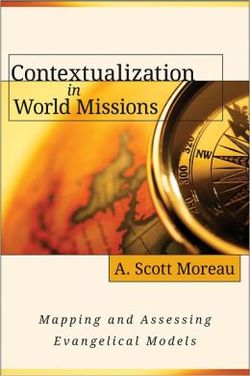
Review: On the surface of things, Contextualization in World Missions: Mapping an Assessing Evangelical Models looks like a book written only for future long-term missionaries and seminary students. And for those sorts of people, Contextualization is a helpful, enjoyable book filled with diagrams, explanations and case-studies.
But Moreau defines contextualization as “the process whereby Christians adapt the whole of the Christian faith . . . in diverse cultural settings.” With this definition in hand, much of the information in this book can be helpful to church planters, pastors, missions boards and lay persons involved in regular outreach and discipleship.
The book is divided into two primary sections. In the first, Moreau explores the philosophical, historical and theological framework for contextualizing the transcendent gospel message to various people-groups. This is pretty weighty stuff, but Moreau’s writing flows so well that the chapters go by rather quickly and are often enjoyable.
The second section explores six of the major types of contextualization methods. He identifies these models as the facilitator, guide, herald, pathfinder, prophet and restorer. He identifies biblical, historical and contemporary figures who exemplifies these models of contextualization. Then he offers a brief, but helpful critique of each model.
While this book is foundational for those involved in missions, I think this book is also helpful for pastors and church planters as they explore what sort of communicator of the gospel they are, as well as how they will best present the gospel of the Lord Jesus Christ in their unique settings.
Rating: 5/5 (I loved it)
Get the book from: Kregel or Amazon.
I received a physical copy of this book for free in exchange for an unbiased review.

 RSS Feed
RSS Feed
